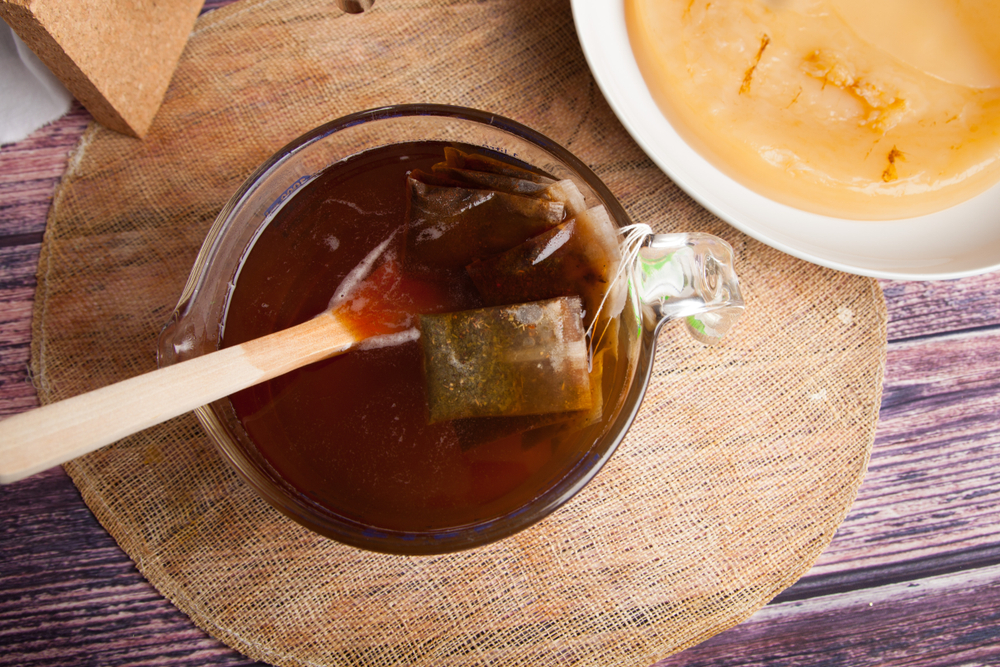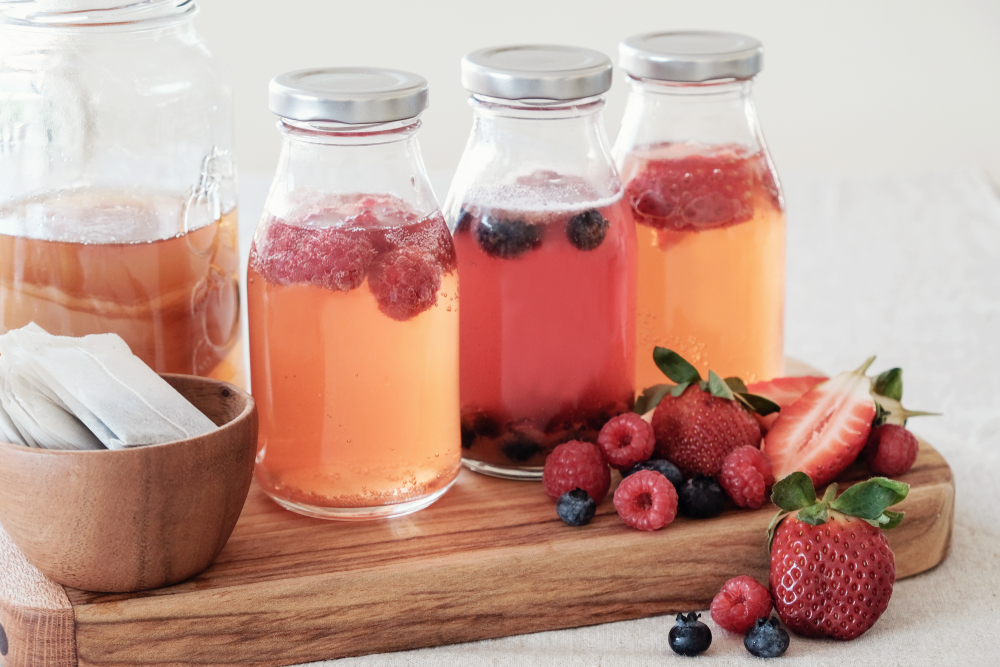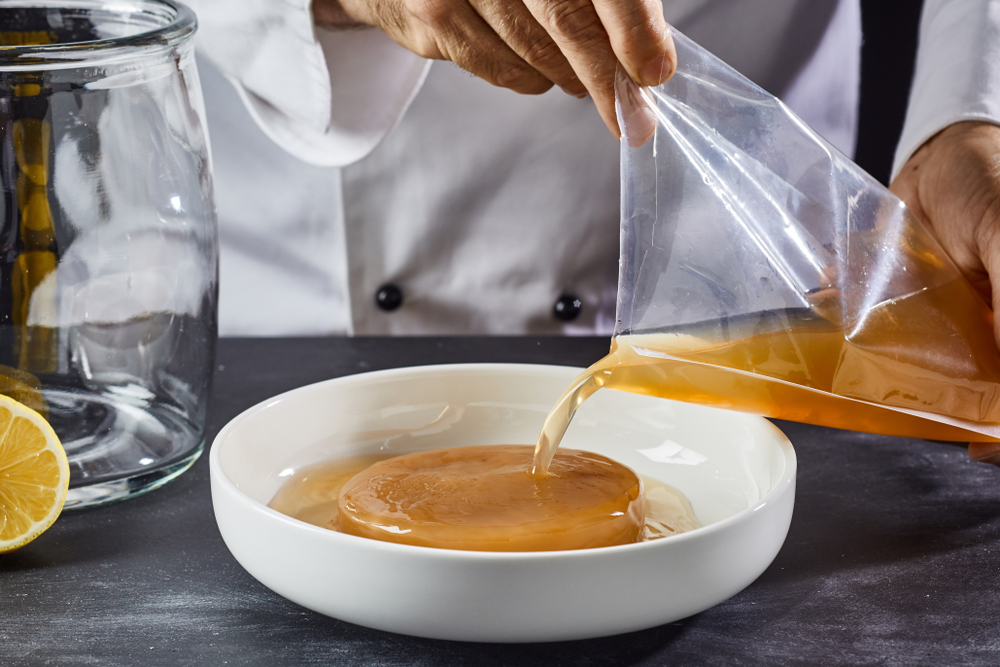Kombucha starter tea—the aged kombucha that contains beneficial probiotics, bacteria, and yeast—is essential when brewing your own homemade kombucha. Imagine it as a parental figure, passing on its beneficial microorganisms to the next wave of kombucha.
Table of Contents
What Is Starter Tea in Kombucha?
When brewing a new batch of kombucha, you need three ingredients: starter tea, a SCOBY (symbiotic culture of bacteria and yeast), and fresh, sweet tea. The starter tea is the previously fermented kombucha that’s to be added to the SCOBY and sweet tea to create a new batch of kombucha.
Starter tea can be any aged, unflavored kombucha that has undergone a fermentation cycle. This liquid culture can be either store-bought or homemade kombucha. It’s often placed in a large glass jar and kept at room temperature, away from direct sunlight. Most brewers cover the jar with a coffee filter or cheesecloth and a rubber band on top of it (to keep the fruit flies away).
Its taste profile is quite zingy due to the carbonation and mildly sweet due to the presence of cane sugar.
How To Use Kombucha Starter Tea
You should be precise with your measurements to brew kombucha at home with starter tea. The ideal ratio of starter tea to fresh sweet tea is 10% and 90%. You can slightly adjust these measurements, but this ratio is deemed safe for proper inoculation of the kombucha and the perfect pH levels for bacteria growth.
If you’re brewing a small batch of kombucha, say two liters, you’ll need at least 200ml of starter tea. Four liters of kombucha require 400ml of starter tea, and so on.

The temperature also matters since colder temperature affects the fermentation process. If you normally use two cups of starter tea in moderate weather, make that three cups during the cooler winter months, when the fermentation process is slower.
Add the SCOBY when the mixture is at room temperature. The SCOBY organisms will die if they SCOBY is submerged in hot liquid.
5 Benefits of Using Starter Tea
The best and most recommended way to make your own kombucha is to use starter tea.
Here are some reasons why starter tea is the superior option:
- You can reuse the same starter tea, providing a consistent flavor profile.
- Using starter tea helps give your new batch of kombucha tea beneficial antioxidants since it’s typically made from black tea or green tea bags.
- Starter tea is also rich in probiotics, which help regulate your digestive system.
- Starter tea is unpasteurized and contains many microorganisms, unlike some kombucha on retail shelves.
- Kombucha starter tea immediately lowers the pH of the liquid, which boosts good bacteria and quickly kills any bad bacteria.
Can You Make Kombucha Without Starter Tea?
An alternative yet controversial option for brewing kombucha is using vinegar instead of starter tea. For every 90% liter of kombucha, you’ll need to add 10% distilled white vinegar—the same proportions as starter tea. Many home brewers advise against vinegar because it can throw off the bacteria/yeast balance and weaken your SCOBY over time. Nowadays that unflavored kombucha is readily available, using vinegar is not necessary. I do not recommend it.
Alternatively, you can also use store-bought kombucha. This option is often pricier than starter liquid, but it’s a great way to enjoy kombucha without waiting weeks for starter tea to ferment. Ensure you purchase raw, organic, unflavored kombucha for the best results.
What Is the Difference Between Starter Tea and Kombucha?
Starter tea is a matured form of kombucha that has undergone one fermentation cycle, resulting in a pH level of about 2.5 to 3.5.
This aged liquid culture contains abundant beneficial good bacteria, including probiotics and antioxidants, that it has acquired over time and from past generations of kombucha. It also can develop new SCOBY on its own, making way for the next batch.
Starter tea is, in essence, kombucha. But, in relation to starter tea, kombucha refers to the resulting liquid that forms after starter tea and a kombucha SCOBY have been mixed with the sweetened tea and fermented twice. Because flavorings are added during the second fermentation cycle, most kombucha teas are flavored, starter tea is not.

Where to Get a Starter Tea
Fortunately, kombucha starter tea is very accessible. You don’t have to look very far to get your hands on it, especially if you know where to look.
Here are some places you can find kombucha starter tea (and an entire kombucha starter kit, for that matter):
- Amazon
- Walmart
- Online retailers
- Local kombucha or tea retailers
That said, one of my favorite ways to get starter tea is asking a kombucha-brewing friend if they have a SCOBY and tea to spare. It’s usually free and well-tested, and your friend can be a great resource when you have questions about the brewing process.

